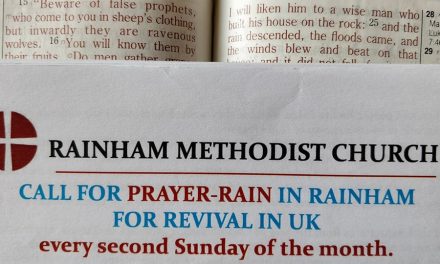He replied, “Isaiah was right when he prophesied about you hypocrites; as it is written: ” ‘These people honour me with their lips, but their hearts are far from me. They worship me in vain; their teachings are merely human rules.’ You have let go of the commands of God and are holding on to human traditions.” And he continued, “You have a fine way of setting aside the commands of God in order to observe your own traditions! – Mark 7:7-9
There is a vain way in which to worship God just as there is also an effective way to worship God. Vain worship is about going through the motions without movement, producing no result or change of hearts. Vain worship promotes formality and theology without spiritual formation. The truth is that without the heartbeat of worship, the Body of Christ will resemble a corpse. Traditions helps but it goes wrong when it elevates above Scripture and it leads to vain worship, hypocrisy, and lip service. The Pharisees and Scribes were worshipping God in vain. They came looking to find fault with Jesus. In our lectionary reading today, ‘Jesus exposes the hypocrisy of the Pharisees, who imposed their interpretation of the Law on the Israelites,’ calling for a blanket all-inclusive ceremonial law upon Jesus’ disciples (Mk 7:1-9). Jesus called these Pharisees hypocrites because they are undermining God’s commands using their tradition making God’s Word nothing (Matt 15:4-6). To make sense of Jesus calls us not to use spiritual language to mask our hypocrisy or disobedience.
Jesus was criticizing the hearts of the Pharisees and Scribes, and the way they were living, using ceremonial law to mask their hypocrisy. The issue of vain and empty worship today is about the matter of the heart. As a result of vain and empty worship practices, Jesus also condemned the Pharisees and Scribes’ distortion of tradition in order to circumvent the law. Jesus is not rejecting the law; in fact, he is rebuking them for their failure to uphold the law. It is important to note that the first Christian and the writers of the first documents made sense of Jesus in term of their obedience of the Scriptures. Even for Jesus, the themes and images of the Holy Scriptures were elemental for him. Jesus did not undermine the Law and the prophets but fulfil them. Contrary was the case with the Pharisees and Scribes in our reading today. Jesus, with reference to a prophecy from Prophet Isaiah accused the Pharisees and Scribes of honouring Him with their lips, but with their hearts far from Him (Is 19:13). We are in a time with a vast army of secularism when and where God is honoured and loved in words, but insulted and disobeyed in practice.
Today, the Pharisees’ in us as religious leaders and worshippers resonates with lip service, saying “Yes” with our mouths but saying “No” in our hearts and our actions. It was the lip services of the religious leaders that prompted Jesus to cleanse the temple by driving out those who were desecrating it. Jesus said, “It is written, ‘My house shall be called a house of prayer’ but you have made it a den of robbers” (Matthew 21:12-13, Jn 2:13-22, Isaiah 56:7).
The Bible says, “The Pharisees and some of the teachers of the law who had come from Jerusalem gathered around Jesus.” Gathering around Jesus or going to the church are not equal to salvation. Gathering around Jesus is not a deterrent to vain worship, lip services or teachings that are merely human rules. What is the profit of gathering around Jesus when we ‘have let go of the commands of God and are holding on to human tradition’? What is the missional effect of gathering around Jesus when we ‘have a fine way of setting aside the commands of God in order to observe your own traditions?’ Worship or gathering around Jesus without making sense of Him amounts to hypocrisy that declines the church. To make sense of Jesus calls us to expose and overcome the fraud of our unbelief, divisions and hypocrisy. The hypocrisy of the Pharisees and the scribes explains the digression of God’s people from true worship and service to God into the hypocrisy and vanity of the religion they practiced. The church today is not free from this digression and Jesus is greatly concern about our vain worship and lip service.
We make sense of Jesus as we repent and stop to repeat words in worship to God without participating in their meaning. For example, when you recite the Lord’s Prayer, “Our Father in Heaven…,” do you really believe there is a real Father in Heaven Who sent His ONLY begotten Son, Jesus Christ, that whosoever believe in Him will not perish but have eternal life? Do you believe that Jesus is coming back to judge the quick and the dead? When we love and follow our own tradition and interpretation rather than God’s Word, our worship and service is vain.
To make sense of Jesus with regard to the Pharisees and Scribes in each of us, the issue is not just that of ritual purity, or even of what traditions Jesus’ disciples ought to follow (or not). The main issue is the state of the human heart. To make sense of Jesus in our church and leadership brings up the matter of the heart with Jesus’ quotation of Isaiah: the hearts of “this people” are far from God (Mark 7:6). “This people,” includes not just the Pharisees and Scribes but also the crowd (v. 14). To make a sense of Jesus, the Gospel reading today is speaking to all worshippers, those who gather around Jesus, including you and me. Remember, besetting sin prevents worship. To make sense of Jesus to overcome vain worship and lip service summons us to repent and stop following human traditions and doctrines of man. We are called to study God’s Word to know if what we are practicing is acceptable to God. Are you ready? Let us pray with Psalm 15.











Recent Comments